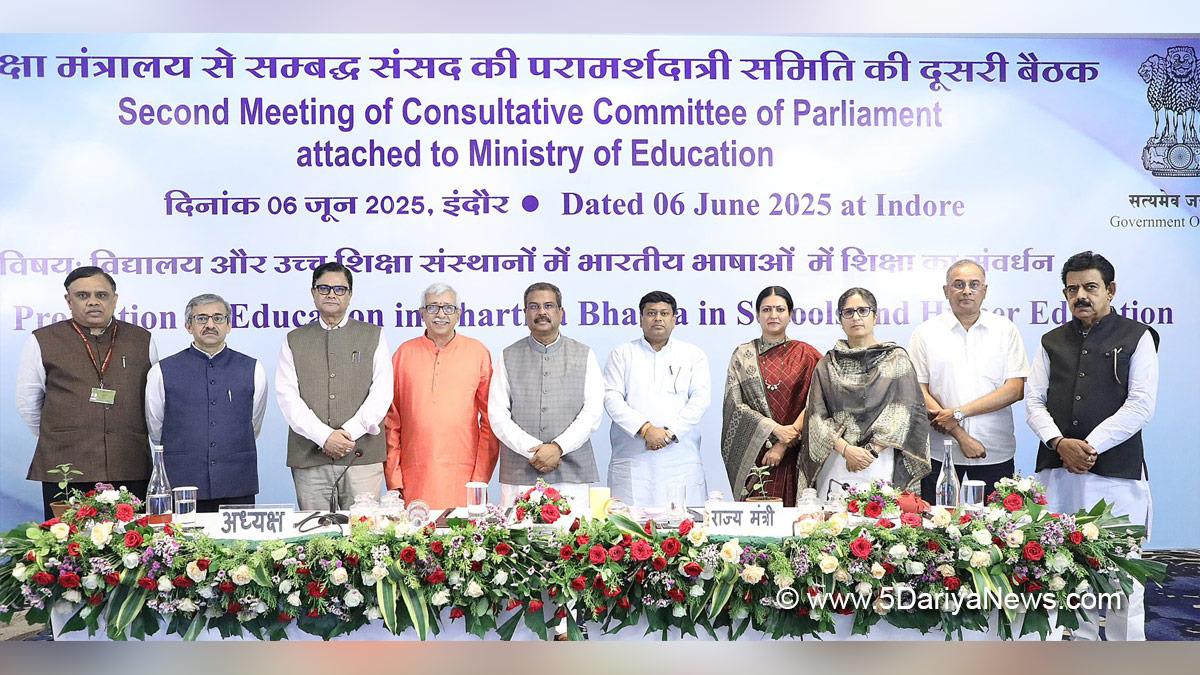Dharmendra Pradhan chairs 2nd meeting of the Consultative Committee of Parliament for Ministry of Education

Union Minister for Education, Shri Dharmendra Pradhan, today chaired a meeting of the Consultative Committee of Parliament for the Ministry of Education on the theme of Promotion of Education in Bharatiya Bhasha in Higher Education, in Indore, Madhya Pradesh. Union Minister of State for Education and Development of the North Eastern Region, Dr. Sukanta Majumdar was also present at the meeting. Secretary, Department of School Education and Literacy, Ministry of Education, Shri Sanjay Kumar; Secretary, Department of Higher Education, Ministry of Education, Dr. Vineet Joshi; and other senior officials of the Ministry, AICTE, UGC, and Bharatiya Bhasha Samiti also attended the meeting.
Shri Dharmendra Pradhan, while addressing the meeting, highlighted the all-round efforts undertaken by the Ministry of Education for promoting mother tongue education and also stressed the need for integrating Bharatiya Bhashas in schools as well as in higher education.
He thanked the Committee Members and Members of Parliament for their participation and valuable suggestions for building strong foundations for the cognitive development of children, promoting inclusivity, and preserving the cultural heritage of the country.
Shri Pradhan also said that in the coming years, the medium of instruction will be primarily in Indian and local languages. He also appreciated the efforts of Higher Education Institutes such as IITs for introducing courses in local languages, including technical courses such as engineering.
The priority remains to provide books in Indian languages, he added. The Minister also emphasized the use of technology in translating content and leveraging AI for language translation. For students coming from rural areas or economically weaker sections, technology can help in understanding the content in their preferred language, he added.
Shri Pradhan also stated that achieving the goal of Viksit Bharat by 2047 requires a strong and developed economy, and education will be the key driver in realizing this vision. Members of Parliament, who attended the meeting, appreciated the material prepared by the Ministry of Education on Bhasha Sangam, which will help students learn 100 sentences in 22 languages.
They also shared their experience of participating in similar exercises during summer vacation in their school days, where they learnt 10–15 sentences in various Indian languages. They appreciated the Ministry’s effort in integrating AI for learning multiple languages and translations.
In the meeting, Shri Sanjay Kumar and Dr. Vineet Joshi presented an overview of the organisations working towards promoting Indian languages. Shri Sanjay Kumar informed about the details of 1369 mother tongues identified in the country, which were classified into 121 languages.
He also noted that these are spoken by more than 10,000 people in the country. Out of these 121 languages, 22 are written in the 8th edition of the Constitution, and 99 other languages are unidentified but spoken by more than 10,000 people, he added.
Shri Sanjay Kumar also informed about the emphasis on multilingualism in NEP 2020 and how the National Curriculum Framework for School Education has been created keeping multilingualism at its core. Dr. Joshi informed on major Policy decisions and initiatives and noted major achievements of the Department of Higher Education.
He also shared information on the events organised by the Ministry for promoting the spirit of multilingualism such as Bharatiya Bhasha Utsav, Matribhasha Diwas, Kashi Tamil Sangamam, National Conference on Technology and Bharatiya Bhasha, etc. AI-Based Translation Tools for Indian languages developed such as Anuvadini and UDAAN and existing Schemes and Projects were also discussed.
Details on the constitution of Bharatiya Bhasha Samiti and the Implementation of Bharatiya Bhasha Pustak Pariyojna as per the Union Budget 2025 Announcement were also shared with the Minister and other stakeholders.
He also shared his insights on the way forward in promoting multilingualism. The Government of India is actively promoting Bhartiya Bhasha in education through the National Education Policy (NEP) 2020.
The policy envisions inclusive, equitable, and culturally rooted progress by encouraging the use of all Indian languages and fostering multilingualism. Several organisations have been working towards this goal, including the Central Hindi Directorate (CHD), Delhi, along with its four regional offices in Chennai, Hyderabad, Guwahati, and Kolkata; the Commission for Scientific & Technical Terminology (CSTT), Delhi; and the Central Institute of Indian Languages (CIIL), among others.
In addition, four Centres of Excellence in classical languages Kannada, Telugu, Odia, and Malayalam have been established to further promote multilingualism. On 3rd October 2024, the Union Cabinet conferred the status of Classical Language to Marathi, Pali, Prakrit, Assamese, and Bengali.
Three Central Universities Central Sanskrit University (CSU), Delhi; National Sanskrit University (NSU), Tirupati (AP); and Shri Lal Bahadur Shastri National Sanskrit University (SLBNSU), Delhi, along with five autonomous bodies under the Ministry of Education, are also contributing to the promotion of Indian languages.

Comments are closed.